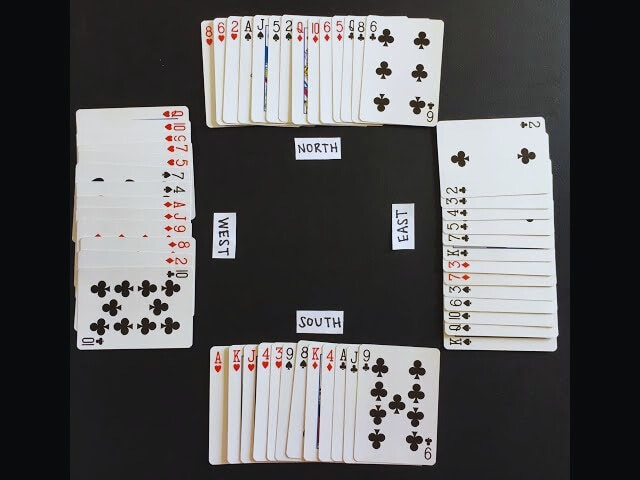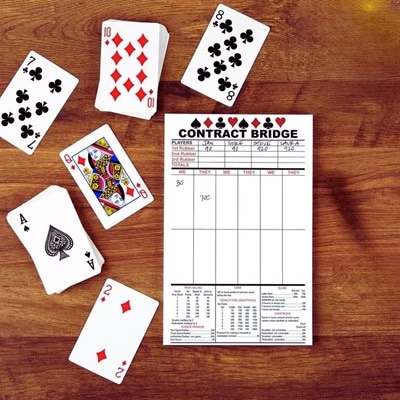
OBJECTIVE OF BRIDGE RULES: The game’s objective is to score points by making bids or defeating the opposing players’ bids. The team with the most points wins.
NUMBER OF PLAYERS: 4 players
MATERIALS FOR BRIDGE: standard 52-card
TYPE OF GAME: Card game
AUDIENCE: All ages
OVERVIEW OF BRIDGE
Did you know Bridge is recognized as a sport by the Olympic Committee? Originating from the game Whist, Bridge is a card game consisting of 4 players with two opposing pairs. The original version of Bridge was popularized in the 19th century. Below we will go into further detail on the rules of Bridge.
If you are looking for more trick-taking games try Rook, Spades, and Hearts!
BRIDGE SET UP AND DEALING
Each player’s position refers to a cardinal point of the compass – North, East, South, and West. North and South are teammates, as are East and West. Teammates sit opposite each other at the table.
The dealer deals 13 cards from a deck of 52 cards in a clockwise rotation, where the hand starts to the dealer’s left, making the deal equal. Players should sort their cards by suit: spades (highest), hearts, diamonds, and clubs (lowest), and rank: A, K, Q, J, 10, 9, 8, 7, 6, 5, 4, 3, 2. Please note, in terms of suits, the ranking is present in bidding only, where, in play, all of the suits are equal.

HOW TO BID
The dealer must start the bidding, choosing to bid or pass. You bid in 2 parts: the number of tricks you think you’ll make and the trump suit you will do it in. The base number of tricks a team needs to win is 6, so you will add the number of tricks you bid. A player may choose any of the four suits, or no trumps, meaning none will be trump.
That was a bit confusing, so here are some examples to clarify things.
- 2 Spades means you will make eight tricks with Spades as trumps. The bid takes the first six tricks for granted, so a bid of 2 means 6+2 = 8.
- A bid of 4 Hearts means you’ll make 10 (6+4) tricks with Hearts as trumps.
- Finally, 3 No Trumps means you’ll make 9 (6+3) tricks with no trump suit.
Once the dealer has bid or passed, the person to their left can bid or pass, and so on. Every player at the table is entitled to bid in turn until three passes follow a bid. You will then play the hand in the last-mentioned suit, or No Trumps. You call this the contract.
MAKING A CONTRACT
The two pairs at the table will compete to determine the contract. The highest bidder will get the contract; for example, player one bids two spades, player two bids three hearts, player three bids four spades, and then three passes. Player three gets the contract with the highest bid (4 spades). The final bid locks the partnership into winning a particular number of tricks. For example, four spades are equal to 10 tricks (out of 13), where spades are the trump card.
HOW TO PLAY BRIDGE
The player to the bid winner’s left starts the play. They may place any card they wish, including a trump card to start the trick. When you play, you must follow suit if possible. For example, if a player starts the trick with a 6 of spades, you must follow the suit and play a spade if you have one in hand.
If you cannot follow suit, you may play any cards to the trick. This will include trump suit cards as well. The winner is determined once all players have played one card to the trick.
You win a trick by having the highest ranking card of the suit lead, as long as no trumps are present. If trumps are in the trick, the winner is the player who plays the highest trump card.
You win a game of Bridge by being the first team/pair to score 100 or more points for successful contracts. Generally, you keep the score on a piece of paper you split into two columns titled ‘WE’ and ‘THEY”. You write successful contract scores below the line and total them to win the game. You write trick bonuses (overtricks) or penalties (undertricks) above the line, and they don’t count toward the total score.
IMPORTANT BRIDGE RULES TO REMEMBER
RULE OF 20
The rule of 20 allows you to determine if your opening hand is worth bidding on. To follow the rule of 20, you will add all the high (face) cards from your hand together and then add the two longest suits you have together. If these totals added together equal 20 or higher, you have a good hand to bid on.
RULE OF 7
The rule of 7 is a very uncommon rule used in Bridge. It helps players determine how many tricks they should wait to use their high card in a no-trump contract. You use the rule of 7 by determining how many cards of the suit your team has and then subtracting that from 7. This will show how often you should play your non-high card to tricks before using it.
RULE OF 11
The rule of 11 allows you to determine how many higher-ranked cards the bid winner has over the leading card. When your partner leads the first card to the trick, you can subtract the card from 11 and determine between you, your partner, and the bidder’s partner what cards remain for the bid winner.
FOLLOWING SUIT
When playing a trick, players must follow suit if they are able. If a player has multiple cards of that suit, they may choose which card to play.
NO TRUMPS
If you win a contract with no trumps, there will be no trump suit during the round. The highest ranked card of the suit led will win each trick. You still must follow suit when able.
SCORING

Each bid must be higher than the previous one; this is where we remind ourselves of the ranking order: spades (highest), hearts, diamonds, and clubs (lowest) and rank: A, K, Q, J, 10, 9, 8, 7, 6, 5, 4, 3, 2. Spades and hearts players call the majors, scoring 30 per trick. On the other hand, diamonds and clubs are the minors and score 20 per trick. No Trumps are the highest scoring, bringing in 40 for the first trick and 30 after that.
BRIDGE STRATEGIES
Here are a few strategies to help you improve your Bridge games.
- Play more often. Practice makes perfect. The more you play the game, the more situations you will see and the more experience you’ll have.
- Think before you play, especially if you are the bid winner. During the first trick, you will go last, which is super advantageous. Look at the cards that were played. Use this information and what you know about you and your partner’s hand to determine which card to play.
- Play with the same partner and learn to read them. The more you learn to communicate with your partner subtly, the better your odds of winning. Knowing when your partner can win a trick or needs help is important.
- Do not be afraid to start with a simple strategy. You do not have to make a convoluted plan to win; sometimes, the basics are the best.
- Finally, use your resources. Determine your hand strength with the rule of 20, or decide when to play your cards using the rule of 7. You can use countless strategies and tricks to become more confident in your plays.
DIFFERENT BRIDGE GAMES
There are plenty of alternative ways for you to enjoy Bridge. We will cover a few below that are popular variations.
RUBBER BRIDGE
Rubber Bridge is a 4-player Bridge variation with two teams competing. You win a rubber when one team wins two games.
CHICAGO BRIDGE
Chicago Bridge differs in length from the other games. You play Chicago Bridge over four deals or multiple sets of four deals.
DUPLICATE BRIDGE
The scoring system is the difference between standard and Duplicate Bridge rules. You will use a match point system in Duplicate Bridge, meaning only one player will score per round.
OTHER SIMILAR GAMES
If you like playing Bridge, you should also check out our rules for similar games like 500 and Spades!
FAQ
Is Bridge a Hard Game to Learn?
People often describe Bridge as one of the harder card games to learn. Its complex bidding system requires a player to stay alert to other players’ cards.
Can Two Players Play Bridge?
Yes, a variant of the standard Bridge rules allows two players to play the game. This version is called Double Dummy Bridge.
Is Bridge a Game of Skill or Luck?
Bridge heavily relies on a player’s skill level. Players who have played the game for years will have much more experience and knowledge about the game, odds, and best plays.
- 12 BEST HARRY POTTER BOARD GAMES - November 16, 2023
- 50 BEST HALLOWEEN GAMES - October 4, 2023
- 50 BEST CHRISTMAS GAMES - September 13, 2023